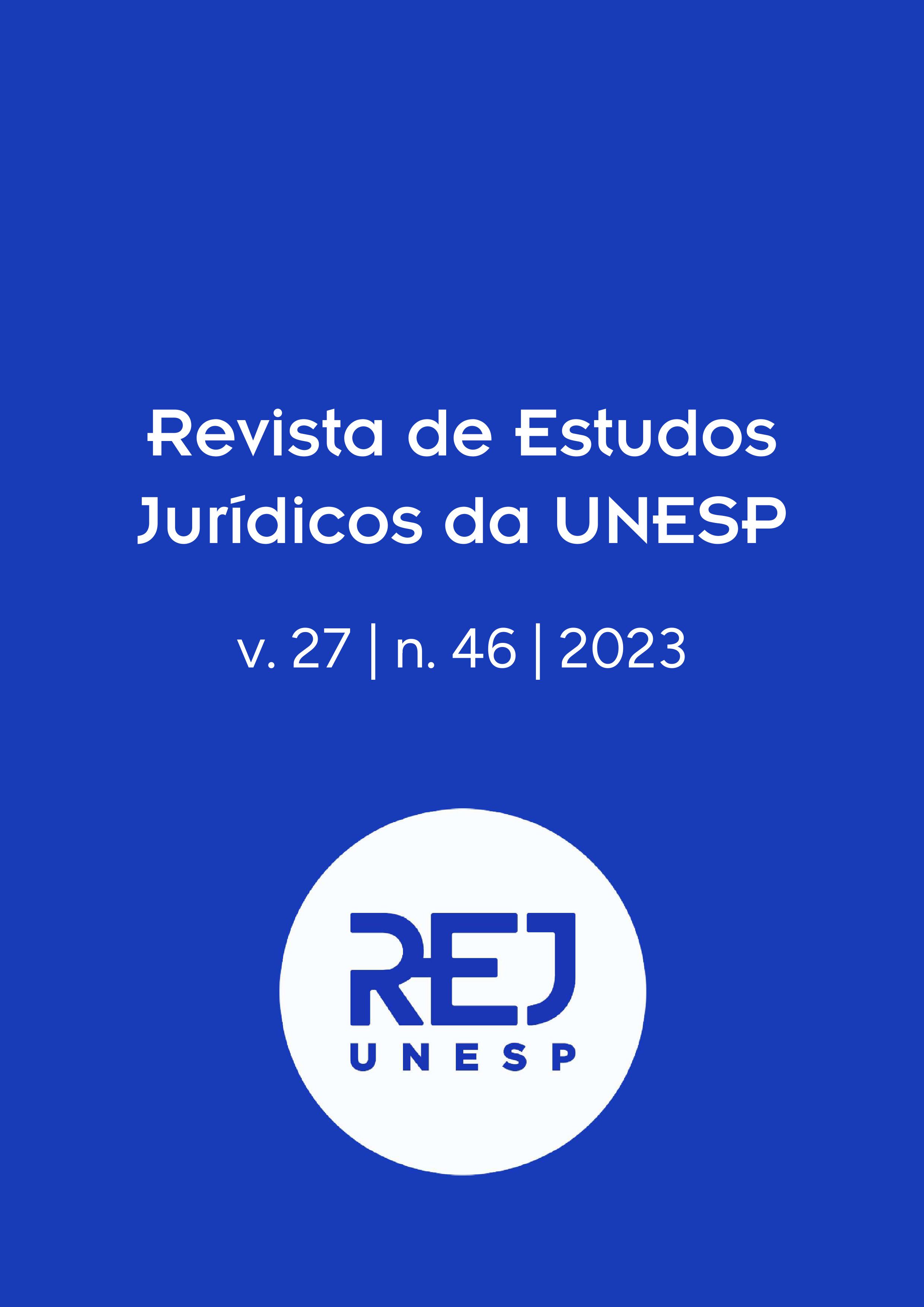ADEQUATE HOUSING AND DOMESTIC VIOLENCE AGAINST WOMEN: ANALYSIS OF BRAZILIAN´S LEGISLATION IN THE LIGHT OF THE UN SYSTEM FOR THE PROTECTION OF HUMAN RIGHTS
DOI:
https://doi.org/10.22171/rejunesp.v27i46.4100Keywords:
HUMAN RIGHTS, ADEQUATE HOUSING, GLOBAL HUMAN RIGHTS SYSTEM, VIOLENCE AGAINST WOMEN, MARIA DA PENHA STATUTEAbstract
The present article aims to discuss about the right of women victims of domestic violance to adequate housing, especially investigating what are the main standards in the Global Human Rights System and then check if the brazilian´s legislation is in harmony with it. At first, considerations about the right of adequate housing are made. Then it is analysed the domestic violence against women and it is showed how both topics are bond to each other. In the sequence it is investigate how the Human Rights Council and some treaty-based bodies treat the study-object. After it is looked if the brazilian’s legislation is harmonic with the standards established in the Global Human Rights System, especially the Maria da Penha statute. The method of approach used in the research was deductive and the method of procedure qualitative. It was made a bibliographic and documental research, collecting doctrine related to the subject and documents from the Human Rights Council and the monitoring committees of the Convention for the Elimination of All Forms of Discrimination against Women and the International Covenant on Economic, Social and Cultural Rights. In the end, it was concluded that, although the Global Human Rights System recognizes the close link between the two themes, it remains a gap in the specific treatment of the issue. In turn, Brazilian legislation is in balance with the main standards of the Global Human Rights System, regarding the right of women victims of domestic violence to decent housing.
Downloads
References
BARROS, Virgínia Coutinho. Gênero e pandemia: casos de violência contra a mulher na América do Sul. Espirales, Foz do Iguaçu/PR, Ed. Especial, p. 13-20, maio 2021. Disponível em: https://revistas.unila.edu.br/espirales/article/view/2790. Acesso em: 18 mar. 2022.
BRASIL. Decreto no 678, de 6 de novembro de 1992. Promulga a Convenção Americana sobre Direitos Humanos (Pacto de São José da Costa Rica), de 22 de novembro de 1969. Disponível em: http://www.planalto.gov.br/ccivil_03/decreto/d0678.htm. Acesso em: 21 mar. 2022.
BRASIL. Decreto nº 1.973, de 1 de agosto de 1996. Promulga a Convenção Interamericana para Prevenir, Punir e Erradicar a Violência contra a Mulher, concluída em Belém do Pará, em 9 de junho de 1994. Disponível em: http://www.planalto.gov.br/ccivil_03/decreto/1996/d1973.htm. Acesso em: 18 mar. 2022.
BRASIL. Decreto nº 4.377, de 13 de setembro de 2002. Promulga a Convenção sobre a Eliminação de Todas as Formas de Discriminação contra a Mulher, de 1979, e revoga o Decreto no 89.460, de 20 de março de 1984. Disponível em: http://www.planalto.gov.br/ccivil_03/decreto/2002/d4377.htm. Acesso em: 18 mar. 2022.
BRASIL. Lei nº 11.340, de 7 de agosto de 2006. Cria mecanismos para coibir a violência doméstica e familiar contra a mulher [...]. Disponível em: http://www.planalto.gov.br/ccivil_03/_ato2004-2006/2006/lei/l11340.htm. Acesso em: 21 mar. 2022.
CAMURÇA, Silvia. ‘Nós mulheres’ e nossa experiência comum. Cadernos de Crítica Feminista, Recife, n. 0, ano 1, 2007. Disponível em: https://soscorpo.org/wp-content/uploads/NosMulheres_e_nossaexperienciacomum_SilviaCamurca2007.pdf. Acesso em: 21 mar. 2022.
CERQUEIRA, Daniel; MATOS, Mariana; MARTINS, Ana Paula Antunes; PINTO JUNIOR, Jony. Avaliando a efetividade da Lei Maria da Penha. Texto para Discussão, Brasília, IPEA, mar. 2015. Disponível em: https://www.ipea.gov.br/portal/images/stories/PDFs/TDs/td_2048k.pdf. Acesso em: 21 mar. 2022.
COUTO, Mônica Bonetti (org.). Comentários ao Pacto de Direitos Econômicos, Sociais e Culturais. São Paulo: Clássica, 2013.
CUNHA, Rogério Sanchez; PINTO, Ronaldo Batista. Violência Doméstica: Lei Maria da Penha – 11.340 – comentada artigo por artigo. 11. ed. São Paulo: Juspodivm, 2021.
DIAS, Maria Berenice. A Lei Maria da Penha na Justiça. 7. ed. São Paulo: Juspodivm, 2021.
FERREIRA, Versalhes Enos Nunes; BRITO FILHO, José Claudio Monteiro de. Direito à moradia e liberalismo Rawlsiano. Argumenta Journal Law, Jacarezinho - PR, n. 30, p. 239-272, jun. 2019. DOI: http://dx.doi.org/10.35356/argumenta.v0i30.1559. Disponível em: http://seer.uenp.edu.br/index.php/argumenta/article/view/1559. Acesso em: 29 mar. 2022.
FÓRUM BRASILEIRO DE SEGURANÇA PÚBLICA. Anuário Brasileiro de Segurança Pública 2019, Brasília, ano 13, 2019. Disponível em: https://www.forumseguranca.org.br/wp-content/uploads/2019/10/Anuario-2019-FINAL_21.10.19.pdf. Acesso em: 18 mar. 2022.
NACIONES UNIDAS, Derechos Humanos. Los derechos de la mujer son derechos humanos. Nova Iorque: Publicació de las Naciones Unidas, 2014. Disponível em: https://www.ohchr.org/sites/default/files/Documents/Publications/HR-PUB-14-2_SP.pdf. Acesso em: 28 mar. 2022.
NASCIMENTO, M. F. do. Moradia adequada: um direito sobressalente como vital em tempos de Covid-19. Cadernos de Ciências Sociais Aplicadas, v. 17, n. 30, p. 84-96, 2020. DOI: 10.22481/ccsa.v17i30.7125. Disponível em: https://periodicos2.uesb.br/index.php/ccsa/article/view/7125. Acesso em: 28 mar. 2022.
ONU. Assembleia Geral das Nações Unidas. Declaração Universal dos Direitos Humanos. 1948. Disponível em: https://brasil.un.org/sites/default/files/2020-09/por.pdf. Acesso em 21 mar. 2022.
OEA. Comissão Interamericana de Direitos Humanos. Relatório anual 2000, n. 54/1, 2001. Disponível em: https://www.cidh.oas.org/annualrep/2000port/12051.htm. Acesso em: 21 mar. 2022.
PAGLIONE, Giulia. Domestic Violence and Housing Rights: A reinterpretation of the right to housing. Human Rights Quaternaly, v. 28, n. 28, p. 120-147, 2006. Disponível em: https://www.jstor.org/stable/20072726. Acesso em: 21 mar. 2022.
PIOSIADLO, Laura Christina Macedo; FONSECA, Rosa Maria Godoy Serpa; GESSNER, Rafaela. Vulnerabilidade para violência doméstica contra a mulher: construção e validação de um instrumento identificador. In: Convibra Saúde – Congresso Virtual Brasileiro de Educação, Gestão e Promoção da Saúde. Anais [...] São Paulo: Convibra, 2012. Disponível em: https://convibra.org/congresso/res/uploads/pdf/2012_59_4184.pdf. Acesso em: 21 mar. 2022.
PIOVESAN, Flávia. A proteção internacional dos direitos das mulheres. EMERJ, Rio de Janeiro, v. 15, n. 57, p. 70-89, jan./mar. 2012. Disponível em: https://www.emerj.tjrj.jus.br/revistaemerj_online/edicoes/revista57/revista57_70.pdf. Acesso em: 21 mar. 2022.
SAMPAIO, Vanessa Bueno; WALDMAN, Ricardo Libel. O direito à moradia adequada à luz do Pacto Internacional de Direitos Econômicos, Sociais e Culturais: uma discussão a partir das perspectivas do ODS n. 11 e da Habitat III. Revista Direito Ambiental e sociedade, v. 9, n. 1, p. 59-85, jan./abr. 2019. Disponível em: http://www.ucs.br/etc/revistas/index.php/direitoambiental/article/view/7508. Acesso em: 22 mar. 2022.
SANTOS, Dayse Amâncio dos; SILVA, Laurileide Barbosa da. Relações entre trabalho e gênero na pandemia do Covid-19: o invisível salta aos olhos. Oikos: Família e Covid-19, Viçosa, v. 32, n. 1, p. 10-34, 2021. DOI: 10.31423/oikos.v32i1.10526. Disponível em: https://periodicos.ufv.br/oikos/article/view/10526/6588. Acesso em: 21 mar. 2022.
SARLET, Ingo Wolfgang. As dimensões da dignidade da pessoa humana: construindo uma compreensão jurídico-constitucional necessária e possível. In: SARLET, Ingo Wolfgang (Org.). Dimensões da dignidade: ensaios de filosofia do direito e direito constitucional. 2. ed. rev. ampl. Porto Alegre: Livraria do Advogado, 2009, p. 9-43.
SARMENTO, Daniel. O mínimo existencial. Revista de Direito da Cidade. Rio de Janeiro, v. 8, n. 4, p. 1644-1689, 2016. DOI: https://doi.org/10.12957/rdc.2016.26034. Disponível em: https://www.e-publicacoes.uerj.br/index.php/rdc/article/view/26034/19156. Acesso em: 21 mar. 2022.
UNITED NATIONS. Women and the right to adequate housing. New York: United Nations Publication, 2012. Disponível em: https://www.ohchr.org/en/special-procedures/sr-housing/women-and-right-adequate-housing. Acesso em: 21 mar. 2022.
UNITED NATIONS. Human Rights Council. Agenda and annotations. Genebra, n. 38/1, 2018. Disponível em: https://documents-dds-ny.un.org/doc/UNDOC/GEN/G18/120/20/PDF/G1812020.pdf?OpenElement. Acesso em: 21 mar. 2022.
UNITED NATIONS. Human Rights Council. Report of the working group on the universal periodic review: Czechia. Genebra, n. 37/4, 2018. Disponível em: https://documents-dds-ny.un.org/doc/UNDOC/GEN/G17/368/07/PDF/G1736807.pdf?OpenElement. Acesso em: 21 mar. 2022.
UNITED NATIONS. Human Rights Council. Report of the working group on the universal periodic review: Chile. Genebra, n. 41/6, 2019. Disponível em: https://documents-dds-ny.un.org/doc/UNDOC/GEN/G19/088/61/PDF/G1908861.pdf?OpenElement. Acesso em: 21 mar. 2022.
UNITED NATIONS. Human Rights Council. Report of the Working Group on the Universal Periodic Review: Iraq. Genebra, n. 43/14, 2020. Disponível em: https://documents-dds-ny.un.org/doc/UNDOC/GEN/G19/351/34/PDF/G1935134.pdf?OpenElement. Acesso em: 21 mar. 2022.
UNITED NATIONS. Human Rights Council. Report of the working group on the universal periodic review: Kuwait. Genebra, n. 44/17, 2020. Disponível em: https://documents-dds-ny.un.org/doc/UNDOC/GEN/G20/070/27/PDF/G2007027.pdf?OpenElement. Acesso em: 21 mar. 2022.
UNITED NATIONS. Human Rights Council. Report of the working group on the universal periodic review: Georgia. Genebra, n. 47/15, 2021. Disponível em: https://documents-dds-ny.un.org/doc/UNDOC/GEN/G21/079/32/PDF/G2107932.pdf?OpenElement. Acesso em: 21 mar. 2022.
UNITED NATIONS. Committee on Economic, Social and Cultural Rights. General comment no. 4: The right to adequate housing (art. 11 (1) of the Covenant). Genebra, 1991. Disponível em: https://tbinternet.ohchr.org/_layouts/15/treatybodyexternal/Download.aspx?symbolno=INT%2fCESCR%2fGEC%2f4759&Lang=en. Acesso em: 21 mar. 2022.
UNITED NATIONS. Committee on Economic, Social and Cultural Rights. General comment no. 7: The right to adequate housing (art. 11 (1) of the Covenant); forced evictions. Genebra, 1997. Disponível em: https://tbinternet.ohchr.org/_layouts/15/treatybodyexternal/Download.aspx?symbolno=INT%2fCESCR%2fGEC%2f6430&Lang=en. Acesso em: 21 mar. 2022.
UNITED NATIONS. Committee on the Elimination of Discrimination Against Women. General recommendation no. 12: Violence against women. Genebra, 1989. Disponível em: https://tbinternet.ohchr.org/Treaties/CEDAW/Shared%20Documents/1_Global/INT_CEDAW_GEC_5831_E.pdf. Acesso em: 21 mar. 2022.
UNITED NATIONS. Committee on the Elimination of Discrimination Against Women. General recommendation no. 19: Violence against women. Genebra, 1992. Disponível em: https://tbinternet.ohchr.org/Treaties/CEDAW/Shared%20Documents/1_Global/INT_CEDAW_GEC_3731_E.pdf. Acesso em: 21 mar. 2022.
UNITED NATIONS. Committee on the Elimination of Discrimination Against Women. General recommendation no. 35: on gender-based violence against women, updating general recommendation no. 19. Genebra, 2017. Disponível em: https://tbinternet.ohchr.org/_layouts/15/treatybodyexternal/Download.aspx?symbolno=CEDAW%2fC%2fGC%2f35&Lang=en. Acesso em: 21 mar. 2022.
Downloads
Published
How to Cite
Issue
Section
License
Copyright (c) 2024 Revista de Estudos Jurídicos da UNESP

This work is licensed under a Creative Commons Attribution 4.0 International License.

























